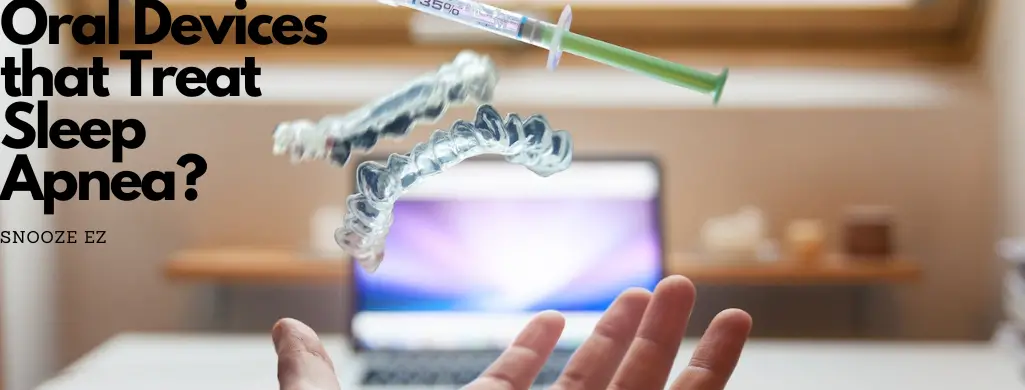There are a few ways to treat obstructive sleep apnea, with oral devices being one of those. These mouthpieces can be worn while you sleep and help symptoms of sleep apnea.
I’m Aaron, sleep expert. We will go into more specifics of:
- How oral devices can treat mild to moderate sleep apnea
- How to purchase an oral device
- What are the advantages/disadvantages
- What questions you should ask your doctor/dentist
How Oral Devices Treat Mild to Moderate Sleep Apnea?
Oral appliance therapy is a popular treatment option for mild to moderate obstructive sleep apnea (OSA). Sometimes they can even be used to help severe sleep apnea, although rare.
This type of therapy involves the use of tongue retaining or oral mandibular advancement devices that are custom-made to fit the patient’s mouth.
These devices work by preventing the tongue from blocking the throat and/or advancing the lower jaw forward, which helps keep the airway open during sleep.
In order for this treatment to be successful, it is important that a sleep specialist and dentist, with expertise in oral appliances, collaborate to determine if this is the best option for each individual patient.
How do I purchase an oral device for Sleep Apnea?
The process of obtaining an oral appliance begins with an evaluation by a dentist who specializes in this type of therapy. The dentist will take impressions of your teeth and create models that will be used to make a custom-fitted device.
Once the device is made, you will need to wear it while sleeping in order for it to be effective. Your doctor may also recommend lifestyle changes such as avoiding alcohol and caffeine before bedtime, losing weight if necessary, and sleeping on your side instead of your back.
With proper use, oral appliance therapy can provide relief from OSA symptoms and improve quality of life.
What are the disadvantages of oral device therapy?
The most common disadvantage of oral appliance therapy is bite changes. This occurs when the device shifts the teeth and jaw out of alignment, leading to pain in the jaw, teeth, and temporomandibular joint (TMJ).
Additionally, loose teeth can occur due to the pressure from the device on the gums and teeth.
In some cases, dental work may need to be replaced due to wear and tear from using an oral appliance.
Other disadvantages include excessive salivation or dry mouth, difficulty speaking or swallowing, and increased snoring. Overall, all these are rare side effects of mouthpieces not fitting properly.
What are the advantages of an oral appliance?
Despite these risks, oral appliance therapy can provide many benefits for those suffering from OSA.
It is non-invasive and comfortable to wear while sleeping.
Additionally, it does not require any surgery or anesthesia and can be adjusted easily if needed.
It is not loud and noisy like a CPAP machine.
Oral device therapy also helps reduce snoring and improve quality of life by improving sleep quality.
Overall, it is an effective treatment option for those with OSA that should be discussed with a sleep specialist and dentist.
What You Should Ask Your Doctor or Dentist
When considering an oral appliance to treat obstructive sleep apnea (OSA), it is important to ask your doctor and dentist questions about the treatment.
Questions such as how much mouth guard therapy will cost, whether it will be covered by medical or dental insurance, what kinds of problems should you be looking for, how many visits this will require, and how many sleep tests you need to take are all important considerations.
It is also important to discuss any potential side effects of the treatment with your doctor or dentist.
Many of these devices can be adjusted so they can provide advice on how to manage any discomfort that may arise from wearing the appliance.
Additionally, they can explain what kind of follow-up care may be necessary after the initial treatment period has ended.
It is essential to understand all aspects of mouth guard therapy before beginning treatment so that you can make an informed decision about whether it is right for you.
If you have any further questions or concerns, do not hesitate to call your doctor or dentist for more information.


